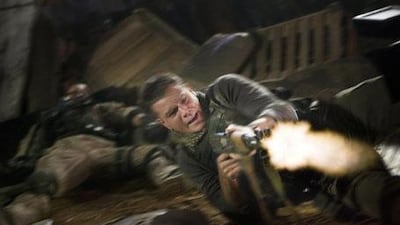The idea of taking all the cinematic elements of the final two movies in the Jason Bourne series and putting them into a real-world setting is what drives Paul Greengrass's Iraq war movie. The Hurt Locker put to bed the idea that every film about the conflict in Iraq would receive a critical and commercial mauling (although it's the DVD sales that have most benefited from the Oscar bonanza). But whereas The Hurt Locker avoided the big picture to concentrate on one soldier's story - in keeping with modern cinematic portraits of the American soldier as flawed hero (Platoon being the prime example) - Greengrass chooses to centre his film around the perfect, upstanding hero who sticks out like a sore thumb in a world of lies and deceit.
The action opens with Roy Miller (Matt Damon), a soldier charged with finding weapons of mass destruction, entering a warehouse that intelligence has identified as a chemical arms manufacturing site. It turns out to be a toilet factory. Miller is understandably getting frustrated at the bad intelligence he's working with and the number of civilian casualties. When he voices his concerns at an intelligence debriefing, he is told in no uncertain terms by a government official (Greg Kinnear in a top-notch performance as the untrustworthy authoritarian) to not question his superiors.
Things start to get interesting when Brendan Gleeson's CIA analyst arrives on the scene and tells Miller that he also believes that the WMD intelligence is not worth the paper it's been written on. Given that anyone who has read a newspaper in the past few years will know this already, these revelations seem rather perfunctory. What is most impressive is how the titbits gleaned from the journalist Rajiv Chandrasekaran's non-fiction book Imperial Life in the Emerald City: Inside Iraq's Green Zone and the increasing amount of information on the fabricated evidence about WMD are to used to turn what at first looks like a standard action war movie into a taut thriller that condemns the American government's willingness to go to war at all costs.
The chase thriller narrative comes after a local Iraqi who calls himself Freddy (Khalid Abdalla) risks his life to tell Miller about a meeting of local army chiefs including an Iraqi general whose biggest claim to fame is being the Jack of Clubs on the infamous American playing card wanted list. It emerges that the general is the key figure in the intelligence reports and some in the American government would prefer him killed rather than captured alive.
As a chase move, Green Zone is effective without ever ramping the tension too high; as a polemic, its message about the untrustworthiness of the American machine is delivered with gusto, but at times it feels like delivering the message is more important than creating characters that aren't clichés. It's an audacious attempt at a political chase movie but one that sometimes suffers from sliding between genres.


